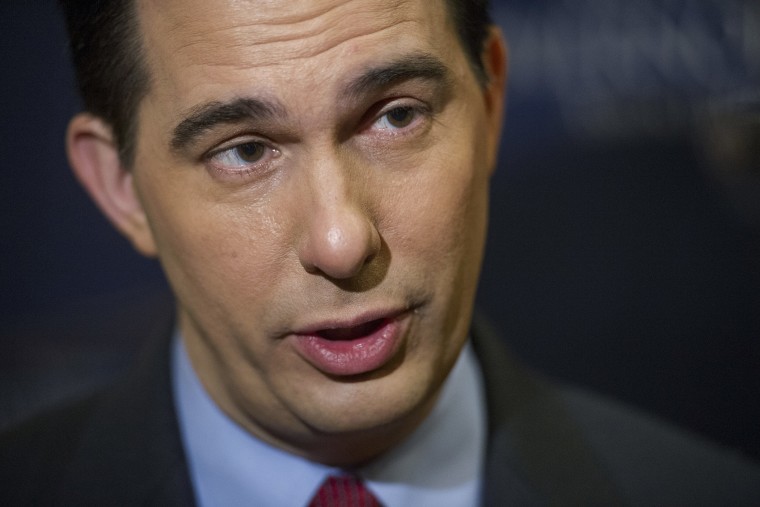Prosecutors in a long-running secret investigation into Wisconsin Governor Scott Walker's campaign activities allege that Walker was at the head of a scheme to illegally coordinate campaign fundraising efforts, according to documents unsealed Thursday.
Prosecutors allege that Walker, a Republican, and two aides led efforts to work with a dozen conservative groups during recall elections in 2011 and 2012, the documents show. Walker's office strenuously denied those allegations in a press release Thursday night calling any accusation of wrongdoing "categorically false" and stating that "two judges, in both state and federal courts, have ruled that no laws were broken."
"This is nothing more than a partisan investigation with no basis in state law," the statement said. "It’s time for the prosecutors to acknowledge both judges' orders to end this investigation."
The investigation's prosecutors, however, call the efforts to coordinate fundraising and spending efforts a "criminal scheme," according to the Milwaukee Journal Sentinel. Walker allegedly directed two top staffers, R.J. Johnson and Deborah Jordahl, to lead the efforts.
The documents include an email from Walker to Republican strategist Karl Rove from 2011. In it, Walker tells Rove of Johnson's importance to coordinating "a team that is wildly successful in Wisconsin. We are running 9 recall elections and it will be like running 9 Congressional markets in every market in the state (and Twin Cities)."
Walker, along with 6 Republican state senators and Lieutenant Governor Rebecca Kleefisch, faced recall elections in 2011 and 2012 after Walker sharply cut public sector union rights, effectively ending collective bargaining for public employees. Three Democratic state senators also faced recalls. More than $137 million was spent on all the recall races, with more than $75 million of that coming from outside interest groups.
One of the groups involved, the Wisconsin Club for Growth, has sued to halt the secret "John Doe" investigation, arguing that it restricts free speech and violates its First Amendment rights.
Walker is running for reelection this year, and is facing a strong challenge from Mary Burke, a former State Commerce Secretary and businesswoman. A May poll conducted by Marquette Univeristy found the two of them tied among all registered voters, with Walker holding a 48-45 lead among likely voters.
While a judge ordered a stop to the investigation in May while he considered the suit, the documents released Thursday were unsealed as a part of that lawsuit.
What these revelations could mean to the circuit court currently considering the investigation's future is still unclear.
"I think that these documents add fuel to the fire that they’re really important investigation and it should be allowed to proceed," Lisa Graves, executive director for the Center for Media and Democracy, a Wisconsin-based watchdog group told msnbc. "These investigations take a lot of care and a lot of time. These bipartisan prosecutors have been under an almost unprecedented assault to try and undermine the investigation."
“For years, Walker has refused to answer questions about his conduct," Michael Czin, of the Democratic National Committee Press Secretary said in a statement. "Now that prosecutors have alleged criminal conduct by Walker, it’s time for him to come clean to the people of Wisconsin and face the consequences, whatever they may be.”
Also unclear is what effect these allegations might have on Walker's national ambitions. While he has said repeatedly that he remains focused on winning a second term as governor Walker has spent much of 2014 positioning himself as a potential 2016 Republican presidential contender, fundraising and making appearances around the country.
Walker has weathered political upheaval since taking office in 2011 - a different John Doe investigation into Walker's Milwaukee County Executive staffers doing campaign work with public resources led to six criminal convictions - but the allegations disclosed Thursday could stick with him.
"In terms of his national chances, this is going to be very hard to get beyond, whether or not there’s any criminal prosecution. it’s going to be the subject of endless media scrutiny if he were to run for president," Rick Hasen, a law professor at University of California, Irvine, told msnbc. "The fact that prosecutors are arguing that the governor is breaking the law seems like something that would resonate if he were on the national political stage."
